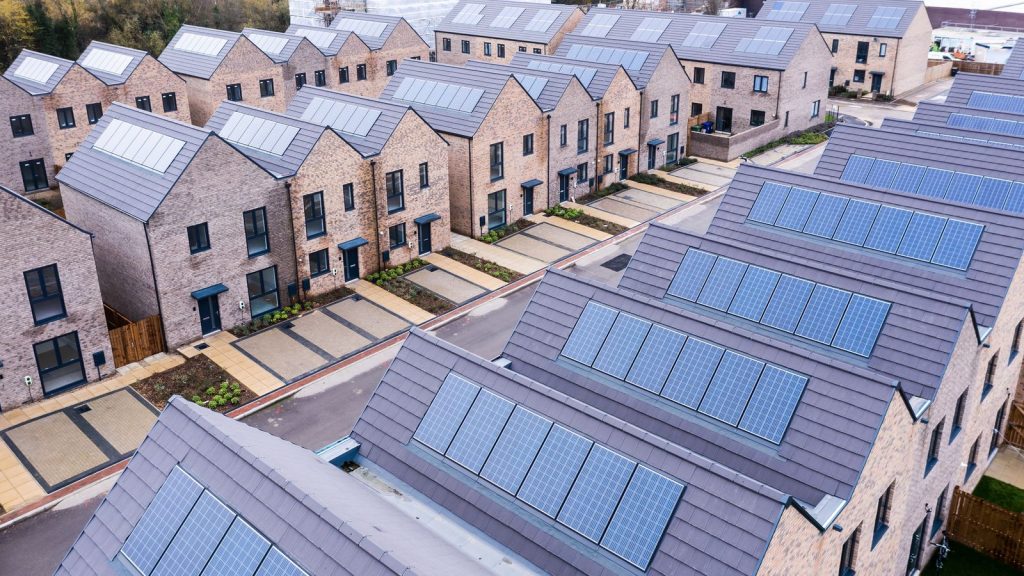The government is being urged to end the “absolute scandal” of new homes being built without solar panels.
Doing so would cut both household bills and greenhouse gases that cause climate change, the Local Government Association (LGA) said in a new report.
Just four in 10 new homes in England come with solar power, according to separate figures from the industry body Solar Energy UK.
Although that is a significant three-fold increase over the space of a year, the LGA said making it mandatory would benefit bill-payers and the climate for years to come, saving people £440 per year.
The UK lags behind its neighbours in the European Union, which last year adopted new legislation demanding all new residential buildings come with solar panels from 2030.
Greenpeace UK called it an “absolute scandal that homes are built without rooftop solar panels in this day and age”.
Its campaigner, Lily Rose Ellis, said: “Given the soaring cost of electricity, our desperate need to cut planet-heating emissions, and the relatively low cost of installation to housebuilders, solar panels on all new builds should be mandatory.”
Last year, Labour promised a “rooftop revolution” that would see millions more homes fitted with solar panels.
But they have been accused of wavering over proposals to make it mandatory, as it also courts the house-building industry to help it meet its target to build 1.5 million homes during this parliament.
The LGA wants the government to allocate them long-term funding in the upcoming spending review so they can help the country meet net zero.
A spokesperson for the Ministry of Housing, Communities and Local Government said they plan to “maximise the installation of solar panels on new homes” in its long-delayed new regulations, the Future Homes Standard, due later this year.
The Home Builders Federation said “Moving forward, to meet the ever more challenging carbon reductions set by government, we will see solar on the overwhelming majority of new homes, albeit it is not appropriate in every situation.”
Pylon rows
The push on solar power is part of the government’s broader plans to ensure all the UK’s electricity comes from green sources by 2030.
Electricity demand is also growing as the country switches to electric cars and heating, and builds more data centres.
All this requires more wind and solar farms, as well as 1,000 kilometres of new cables to carry the electricity from where it is generated – often a wind farm in the North Sea – to where it is used in urban areas far away.
In parts of the country like East Anglia, a row has been simmering over whether to run those cables overhead on pylons or, to protect countryside views, underground.
A hefty new report by the Institution of Engineering and Technology today weighed in on the debate, finding underground cables are on average 4.5 times more expensive than overhead lines.
Liam Hardy, head of research at thinktank Green Alliance, said: “Those costs need to go somewhere. They go on to all of our electricity bills. And of course, it’s the poorest in society for whom those bills make up a bigger percentage of their income.
He added: “What they want to see is value for money as we build out that clean infrastructure that we need.”
The government has promised communities disrupted by the new infrastructure that they should reap some of the benefits, including giving households near new pylons £2,500 off their energy bills over 10 years.



